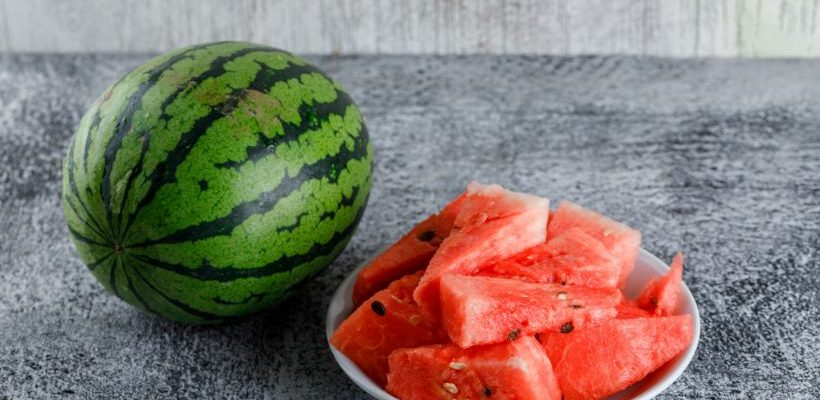
As we delve into the warmth of summer, there’s no better time to explore the numerous health benefits of watermelon, a fruit that has been a refreshing staple for thousands of years.
Watermelon, often debated as a potential “superfood,” is packed with essential nutrients that make it a valuable addition to a healthy diet in 2025.
Rich in vitamins, particularly vitamin C and vitamin A, watermelon is a powerhouse of antioxidants, with lycopene being one of its most notable compounds. Lycopene not only contributes to the fruit’s vibrant color but also plays a crucial role in reducing inflammation and oxidative stress, which can help protect against chronic diseases such as cancer and cardiovascular disorders.
Watermelon’s high water content, making up about 92% of the fruit, makes it an excellent choice for staying hydrated during the summer months. It is also a good source of potassium and magnesium, which are vital for maintaining healthy blood pressure and supporting overall heart health.
In this blog post, we will delve into the detailed health benefits of watermelon, including its anti-cancer properties, its impact on the immune system, and how it can help alleviate inflammation. We will also discuss the best time to eat watermelon, how to cut it effectively, and what to avoid eating with it to ensure you get the most out of this nutritious fruit without any adverse effects. So, let’s dive into the world of watermelon and explore why it should be a part of your healthy diet in 2025.
Watermelon Nutrition Facts
Watermelon is a nutrient-dense fruit that offers a plethora of health benefits due to its rich nutritional profile. One cup of diced raw watermelon (approximately 152 grams) contains only 46 calories, making it a low-calorie and refreshing snack. It is composed of about 92% water, which, along with electrolytes such as potassium and magnesium, makes it an excellent choice for staying hydrated, particularly during the hot summer months.
In terms of macronutrients, watermelon provides 11.5 grams of carbohydrates, 0.6 grams of fiber, and 9.4 grams of natural sugars, with minimal protein and fat content. It is an excellent source of essential vitamins, including vitamin C, which accounts for about 12-14% of the daily adult requirement, and vitamin A, contributing around 5% of the daily value.
Watermelon is also renowned for its high content of antioxidants, including lycopene, which is present in higher amounts than in any other fresh fruit or vegetable. Lycopene, along with other carotenoids like beta carotene and cucurbitacin E, helps protect the body from free radical damage, oxidative stress, and may have anticancer properties.
Additionally, watermelon contains other vital nutrients such as citrulline and arginine, which are important amino acids for muscle movement, nerve function, and overall cardiovascular health. It is also a good source of minerals like potassium, magnesium, and phosphorus, which are crucial for maintaining healthy blood pressure, nerve function, and overall organ health.
Overall, the nutritional profile of watermelon makes it a valuable addition to a healthy diet, providing hydration, essential nutrients, and a range of health benefits while being low in calories and rich in antioxidants.
Best Way to Cut a Watermelon
1. Wash the Watermelon
Rinse the watermelon thoroughly under running water and dry it with a clean towel to remove any dirt or bacteria.
2. Cut Off the Ends
- Place the watermelon on the cutting board.
- Slice off both ends (about 1 inch) to create flat surfaces for stability.
3. Slice It in Half
- Stand the watermelon upright on one of the flat ends.
- Slice it down the middle into two halves.
4. Quarter the Watermelon
- Lay each half flat side down.
- Cut each half in half again to create quarters.
For Cubes:
1. Remove the Rind:
- Take one quarter and place it flesh-side up.
- Carefully slice away the rind, following the curve of the fruit.
2. Cut into Strips:
- Slice the watermelon flesh into long strips about 1-2 inches wide.
3. Cut into Cubes:
- Turn the strips 90 degrees and cut across to create cubes.
Tips:
- Use a large knife for smooth and easy cutting.
- For presentation, consider using a melon baller for round shapes.
- Chill the watermelon in the refrigerator before cutting for a cooler treat.
or learn from the experts! See step-by-step instructions on the proper way to cut a watermelon, by Marrow Private Chefs and Sophia Bell.
General Health Benefits of Watermelon Juice
- High hydration content: Watermelon is composed of about 92% water, making it excellent for staying hydrated and supporting overall bodily functions.
- Rich in antioxidants like lycopene, beta-carotene, and cucurbitacin E, which protect the body from free radical damage and oxidative stress.
Health Benefits of Watermelon Juice for Men
Lycopene
Lycopene is an antioxidant linked to a reduced risk of prostate cancer and other diseases.
Citrulline
Citrulline converts to arginine in the body, helping in the synthesis of nitric oxide, which acts as a vasodilator to improve blood flow and potentially enhance sexual health.
The Benefits of Watermelon Juice for Female Health
Vitamins
Watermelon juice is rich in vitamins A and C, as well as potassium and magnesium, essential for maintaining healthy skin and immune function.
Collagen
Watermelon juice supports collagen production due to its high vitamin C content, helping in skin health and reducing the appearance of fine lines and wrinkles.
Antioxidants like lycopene and beta-carotene in watermelon protect the skin from sun damage and oxidative stress, preventing dry skin and flaking.
Vitamin A derived from beta-carotene aids in repairing skin cells, further enhancing skin health.
Additional Benefits
- Supports immune function due to its high content of vitamins and antioxidants.
- May help in reducing inflammation and improving overall cardiovascular health.
- Low in calories and rich in nutrients, making it a healthy addition to a balanced diet.
- Citrulline and arginine help improve blood flow and reduce blood pressure, which may have positive effects on erectile function and overall sexual well-being for both men and women.
Health Benefits of Watermelon Seeds
- Antioxidant Properties
- Vitamins and Minerals
- Protein and Fatty Acids
Side Effects to Consider When Eating Watermelon Seeds
While watermelon seeds are generally safe to consume, there are a few considerations to keep in mind:
- Allergic Reactions – Some individuals may be allergic to watermelon seeds, so it is important to monitor for any signs of an allergic reaction, such as itching, swelling, or difficulty breathing.
- Digestive Issues – Consuming large quantities of watermelon seeds can cause digestive discomfort due to their high fiber and fat content. It is advisable to start with small amounts and gradually increase consumption.
- Interaction with Medications – The high zinc content in watermelon seeds can interact with certain medications, such as blood thinners and antibiotics. It is recommended to consult with a healthcare provider before making significant changes to your diet.
Incorporating watermelon seeds into your diet can be as simple as sprinkling them on your morning cereal, mixing them into smoothies, or adding them to salads. With their rich nutritional profile and numerous health benefits, watermelon seeds are an underrated superfood that can enhance your overall well-being and sexual health. So, don’t be shy – dig out those watermelon seeds and reap all their glorious advantages today!
Best Time to Eat Watermelon
- Morning or Early Afternoon
- Pre-Workout Snack
- Afternoon
Eating Watermelon at Night
The best time to eat watermelon depends on your health goals and digestion preferences.
While watermelon is often associated with daytime consumption due to its refreshing and hydrating properties, there are some potential benefits to eating it at night, although these must be balanced against some potential drawbacks.
- Hydration: Watermelon, with its 92% water content, can help maintain hydration levels even at night, which is crucial for overall health and bodily functions.
- Antioxidant Properties: The antioxidants in watermelon, such as lycopene and vitamin C, can help reduce oxidative stress and protect the body from free radical damage, even during the night when the body is in repair mode.
- Sleep Quality: The magnesium content in watermelon can help regulate sleep quality, duration, and tranquility, making it a beneficial snack for those struggling with insomnia or sleep disorders.
How Eating Watermelon at Night Can Boost Women’s Health
For women, eating watermelon at night can have several specific benefits:
- Reduced Morning Sickness: Pregnant women may find that consuming watermelon in the evening helps reduce morning sickness and pregnancy-related swelling due to its high water content and hydrating properties.
- Hormonal Balance: The vitamins and minerals in watermelon, including vitamin C and magnesium, can help balance sex hormones and support overall reproductive health, even when consumed in the evening.
- Improved Sleep: The magnesium in watermelon can also help women achieve better sleep quality, which is essential for hormonal balance and overall well-being.
The Advantages of Enjoying Watermelon at Night for Men
For men, the benefits of eating watermelon at night are largely tied to its sexual health advantages:
- Enhanced Erectile Function: The citrulline in watermelon, which converts to arginine in the body, can help relax blood vessels and improve blood flow to the genitals, even when consumed in the evening. This can lead to better erectile function and overall sexual performance.
- Increased Libido: The combination of citrulline, arginine, and other nutrients in watermelon may also help boost libido in men, making it a beneficial snack before bedtime if sexual activity is anticipated.
- Improved Sleep and Recovery: The antioxidants and magnesium in watermelon can aid in muscle recovery and improve sleep quality, which is crucial for maintaining healthy testosterone levels and overall physical performance.
How Eating Watermelon at Night Can Support Your Weight Loss Journey
While eating watermelon at night is not typically recommended for weight loss due to its high water and sugar content, there are some considerations:
- Hydration and Satiety: Watermelon can help keep you hydrated and feeling full, which might reduce the urge for late-night snacking on less healthy options. However, it is essential to consume it in moderation to avoid overhydration and potential digestive issues.
- Metabolic Support: The vitamins and minerals in watermelon, such as vitamin B6 and magnesium, support energy metabolism and can aid in the body’s natural processes, even during the night. However, the high sugar content means it should be eaten sparingly to avoid disrupting weight loss efforts.
Considerations for Eating Watermelon at Night
Despite these benefits, there are some important considerations when eating watermelon at night:
- Digestive Issues: Watermelon’s high water and acidic content can trouble digestion, especially if consumed close to bedtime. This can lead to stomach troubles, bowel irritation, and disrupted sleep.
- Overhydration: The high water content in watermelon can cause frequent trips to the bathroom at night, potentially disturbing sleep. Additionally, it can lead to water retention and swelling if not consumed in moderation.
- Sugar Content: While natural, the sugar in watermelon is still a consideration for those monitoring their sugar intake, especially at night when it can interfere with sleep and weight management.
In conclusion, while there are some benefits to eating watermelon at night, such as improved hydration, antioxidant protection, and potential sexual health advantages, it is crucial to be mindful of the potential drawbacks. Consuming watermelon in moderation and avoiding it close to bedtime can help maximize its benefits while minimizing any adverse effects.
Health Benefits of Watermelon Rind
The watermelon rind, often discarded as waste, is a treasure trove of nutritional benefits. From aiding digestion and controlling blood pressure to boosting athletic performance and supporting immune function, the rind offers a wide range of health advantages. By incorporating watermelon rind into your diet, you can enhance your overall health while reducing food waste. So next time you enjoy a slice of watermelon, don’t throw away the rind – use it to your health’s advantage.
Nutritional Profile of Watermelon Rind
The watermelon rind is rich in various nutrients, including vitamins, minerals, amino acids, and antioxidants. Here are some of the key components:
- Vitamins and Minerals: Watermelon rind is a good source of vitamins A, C, and B6, as well as minerals like potassium, magnesium, and zinc. These nutrients are essential for maintaining healthy skin, immune function, and overall bodily health.
- Fiber Content: The white part of the watermelon rind is particularly high in fiber, which aids in digestion, promotes regular bowel movements, and helps manage cholesterol and blood sugar levels.
- Citrulline and Amino Acids: The rind contains a significant amount of citrulline, an amino acid that is converted into arginine in the body. Arginine helps in the production of nitric oxide, which dilates blood vessels, improving blood flow and overall heart health.
- Antioxidants and Chlorophyll: Watermelon rind is rich in antioxidants such as lycopene, flavonoids, and phenolic compounds, as well as chlorophyll, which helps in blood building and has various health benefits.
Here are some health benefits of eating watermelon rind:
- Digestive Health: The high fiber content in watermelon rind helps in maintaining regular bowel movements, reducing the risk of colon diseases, and managing cholesterol and blood sugar levels. This makes it an excellent addition to a diet aimed at improving gut health.
- Blood Pressure Control: The citrulline in watermelon rind has been shown to help reduce blood pressure in adults with hypertension. By converting to arginine and then to nitric oxide, it helps in dilating blood vessels, which can lower blood pressure and improve overall cardiovascular health.
- Athletic Performance and Libido: Citrulline in the rind can also boost athletic performance by improving blood flow to the muscles. Additionally, it has been linked to improved erectile function in men with mild to moderate erectile dysfunction due to its ability to enhance blood flow.
- Immune System and Skin Health: The vitamins and minerals, particularly vitamin C and A, in the watermelon rind support immune function and skin health. These antioxidants help protect the body from oxidative stress and can improve skin elasticity and overall appearance.
- Low Calorie and High Nutrient Content:Watermelon rind is low in calories but high in nutrients, making it an excellent addition to a weight management diet. It adds bulk and variety without increasing caloric intake, helping in achieving and maintaining a healthy weight.
Creative Ways to Consume Watermelon Rind
While the rind can be eaten raw and tastes similar to a cucumber, there are several creative ways to incorporate it into your diet:
- Pickled Watermelon Rind: A popular method, especially in Southern cuisine, where the rind is pickled with lemon juice and spices.
- Smoothies and Juices: Blend the rind with other fruits, such as strawberries and lemons, to create a refreshing and nutritious drink.
- Salads and Stir-Fries: Shred the rind and add it to summer salads or stir-fries for an extra boost of fiber and nutrients.
- Frozen Treats: Use the rind to make popsicles or add it to frozen smoothies for a healthy and refreshing snack.
Watermelon Peel Health Benefits
The white rind of the watermelon, often referred to as the peel, is a rich source of various nutrients that can enhance overall health.
- High in Fiber and Vitamins: Watermelon peel is high in fiber, which aids in digestion and helps regulate blood sugar and cholesterol levels. It is also a good source of vitamins A and C, as well as other essential vitamins and minerals like potassium and magnesium.
- Citrulline and Arginine: One of the most significant benefits of watermelon peel is its high content of citrulline, an amino acid that is converted into arginine in the body. Arginine is crucial for producing nitric oxide, which helps relax blood vessels, improve blood flow, and support muscle development. This makes watermelon peel particularly beneficial for cardiovascular health and muscle recovery.
- Antioxidants and Anti-Inflammatory Properties: The peel contains a variety of antioxidants, including lycopene, cucurbitacin E, and other flavonoids and phenolic compounds. These antioxidants help protect the body from oxidative stress, reduce inflammation, and may even have anti-cancer properties by inhibiting tumor formation and promoting cell death in cancer cells.
- Digestive Health: The fiber in watermelon peel supports healthy digestion, helps regulate bowel movements, and prevents constipation. Additionally, the potassium and magnesium content aids in detoxification and helps manage blood flow and hydration levels within the body.
Watermelon Peel Benefits for Skin
The nutritional profile of watermelon peel makes it an excellent addition to a skincare routine, both when consumed and when applied topically.
- Vitamin A and C: Watermelon peel is rich in vitamins A and C, which are essential for skin health. Vitamin A, derived from beta-carotene, helps repair skin cells, preventing dry skin and flaking. Vitamin C boosts collagen production, which gives strength and elasticity to the skin, reducing the appearance of fine lines and wrinkles.
- Antioxidant Protection: The antioxidants in watermelon peel, such as lycopene and other carotenoids, protect the skin from UV damage and free radical formation. This helps slow down the aging process and maintains healthy, youthful-looking skin.
- Hydration and Skin Nourishment:The high water content and electrolytes in watermelon peel help keep the skin hydrated and nourished. When applied topically, watermelon peel can act as a natural moisturizer, reducing skin dryness and improving overall skin texture.
How To Use The Watermelon Peel
To reap the benefits of watermelon peel, you can incorporate it into your diet in several ways:
- Salads: The white rind of the watermelon tastes similar to cucumber and can be added to salads for a fresh and crunchy texture.
- Smoothies: Blend the peel into your favorite smoothies to boost the nutritional content and enjoy the health benefits.
- Topical Application: You can puree the peel and apply it as a face mask or use it as a natural skin toner to benefit from its antioxidant and hydrating properties.
In conclusion, the watermelon peel is far more than just a disposable part of the fruit; it is a treasure trove of nutrients that can enhance your overall health and skin well-being. By incorporating it into your diet and skincare routine, you can harness its numerous benefits and reduce food waste at the same time.
Side Effects of Eating Watermelon
Eating too much watermelon can cause a variety of uncomfortable side effects due to its high water, fiber, and sugar content:
- Digestive Issues: Consuming large quantities of watermelon can lead to digestive problems such as diarrhoea, bloating, gas, and abdominal discomfort. This is partly due to the sorbitol and lycopene content, which can encourage loose stools and gas issues.
- Blood Sugar Spikes: Watermelon has a high glycemic index, which means it can rapidly increase blood sugar levels, particularly problematic for individuals with diabetes or insulin resistance.
- Over-Hydration: The high water content in watermelon can cause over-hydration or water intoxication, leading to a loss of sodium levels in the body, swelling in the legs, exhaustion, and weak kidneys.
- Cardiovascular Problems: Excessive consumption of watermelon can lead to cardiovascular issues due to the high potassium content, which can cause irregular heartbeat, weak pulse rate, and other heart-related problems.
Potential Side Effects of Erythrosine in Watermelon
Erythrosine, a synthetic food dye, is not typically found in natural watermelons. However, if watermelon products (like watermelon candies or flavored drinks) contain erythrosine, it could potentially cause side effects such as:
- Allergic Reactions: Some individuals may be allergic to erythrosine, which can cause symptoms like hives, itching, and in severe cases, anaphylaxis.
- Other Health Issues: Erythrosine has been linked to potential health risks such as hyperactivity in children and thyroid problems, although these are more commonly associated with long-term consumption rather than occasional exposure.
Impacts of Consuming Black Seeds in Watermelon
Black seeds in watermelon are generally safe to consume and are actually considered nutritious. However, there are a few considerations:
- Digestive Issues: While rare, some individuals might experience digestive discomfort if they consume large quantities of watermelon seeds due to their high fiber and fat content.
- Allergic Reactions: Although rare, some people may be allergic to watermelon seeds, which could lead to symptoms similar to those of a watermelon allergy, such as hives, stomach pain, and nausea.
Steps to Mitigate Side Effects Associated with Watermelon Consumption
To avoid the side effects associated with eating watermelon, here are some general guidelines:
- Consume in Moderation: Eat watermelon in moderate amounts to avoid digestive issues, blood sugar spikes, and over-hydration.
- Monitor Blood Sugar: Individuals with diabetes or insulin resistance should be cautious and monitor their blood sugar levels when consuming watermelon.
- Balance Electrolytes: Ensure you balance your electrolyte intake to avoid imbalances, especially if you consume large amounts of watermelon.
- Check for Allergies: Be aware of the possibility of a watermelon allergy and seek medical attention if you experience any allergic symptoms.
By being mindful of these potential side effects and taking the necessary precautions, you can enjoy the nutritional benefits of watermelon while minimizing any adverse reactions.
Conclusion
Eating watermelon every day can have significant benefits for your immune system. The citrulline and arginine found in watermelon help in the production of nitric oxide, which is essential for dilating blood vessels and ensuring efficient blood flow. This can be particularly beneficial for organs such as the kidneys, lungs, and the entire cardiovascular system.
However, it’s important to be aware of the potential health risks associated with consuming watermelon, especially for those with diabetes or digestive issues. Eating too much watermelon can cause blood sugar spikes, bloating, and digestive discomfort due to its high sugar and FODMAP content. The best time to eat watermelon depends on your health goals and digestion preferences
Citations:
- Eating Well. Is watermelon good for you? [https://www.eatingwell.com/is-watermelon-good-for-you-8680366]
- Medical News Today. Watermelon health benefits. [https://www.medicalnewstoday.com/articles/266886]
- Healthline. Watermelon health benefits. [https://www.healthline.com/health/food-nutrition/watermelon-health-benefits]
- Mayo Clinic Health System. The wonders of watermelon. [https://www.mayoclinichealthsystem.org/hometown-health/speaking-of-health/the-wonders-of-watermelon]
- WebMD. Health benefits of watermelon. [https://www.webmd.com/diet/health-benefits-watermelon]
- Cleveland Clinic. Benefits of watermelon. [https://health.clevelandclinic.org/benefits-of-watermelon]
- Healthline. Watermelon rind benefits. [https://www.healthline.com/health/food-nutrition/watermelon-rind-benefits]
- Medical News Today. Side effects of eating too much watermelon.[https://www.medicalnewstoday.com/articles/322783]
- BibGuru. 2017. How to cite “Watermelon” by Marian Keyes. [https://www.bibguru.com/b/how-to-cite-watermelon/]
- Bioconductor. 2024. The wateRmelon User’s Guide. [https://www.bioconductor.org/packages/release/bioc/vignettes/wateRmelon/inst/doc/wateRmelon.html]
- WatermelonDB. Advanced Fields – WatermelonDB. [https://watermelondb.dev/docs/Advanced/AdvancedFields]
- For Men Health. 2024. Top 7 Amazing Benefits of Watermelon Sexually for Men (Don’t Miss!). [https://www.formen.health/blogs/sexual-health/benefits-of-watermelon-sexually]
- Green Travel Blog. Watermelon rind benefits. [https://green-travel-blog.com/green_pearls_insighs/watermelon-rind-benefits/]
- Hindustan Times. Watermelon rind benefits: Do not discard white layer of watermelon, it can offer these surprising benefits. [https://www.hindustantimes.com/lifestyle/health/watermelon-rind-benefits-do-not-discard-white-layer-of-watermelon-it-can-offer-these-surprising-benefits-101716721488020.html]
- Dr. Axe. Benefits of watermelon. [https://draxe.com/nutrition/benefits-of-watermelon/]
- Star Health. Watermelon health benefits. [https://www.starhealth.in/blog/watermelon-health-benefits/]
- MedicineNet. Why is too much watermelon not good for you? [https://www.medicinenet.com/why_is_too_much_watermelon_not_good_for_you/article.htm]
- Northwest Health. 11 top watermelon health benefits. [https://www.nwhealth.edu/news/11-top-watermelon-health-benefits/]
- Times of India. 3 valid reasons you should stop having watermelon at night. [https://timesofindia.indiatimes.com/life-style/health-fitness/diet/3-valid-reasons-you-should-stop-having-watermelon-at-night/photostory/75427434.cms]
- Vedantu. Uses of watermelon rind. [https://www.vedantu.com/evs/uses-of-watermelon-rind]
- MindBodyGreen. Watermelon rind benefits. [https://www.mindbodygreen.com/articles/watermelon-rind]
- Faith Fueled Moms. Why is the watermelon rind so good for you? [https://faithfueledmoms.com/why-is-the-watermelon-rind-so-good-for-you/]
- Instacare. Benefits of watermelon seeds. [https://instacare.pk/blog/benefits-of-watermelon-seeds]
- Marham. Benefits of watermelon sexually. [https://www.marham.pk/healthblog/benefits-of-watermelon-sexually/]
- Pulse.ng. Benefits of watermelon sexually. [https://www.pulse.ng/lifestyle/benefits-of-watermelon-sexually/6rq0ky5]
- For Men Health. Benefits of watermelon sexually. [https://www.formen.health/blogs/sexual-health/benefits-of-watermelon-sexually]
- Hims. Benefits of watermelon sexually. [https://www.hims.com/blog/benefits-of-watermelon-sexually]
- Ro.co. Benefits of watermelon sexually. [https://ro.co/erectile-dysfunction/benefits-of-watermelon-sexually/]
- Food.NDTV. 5 side effects of eating too much watermelon. [https://food.ndtv.com/health/5-side-effects-of-eating-too-much-watermelon-1843398]
- India Today. 2024. What are the side effects of having too much watermelon? [https://www.indiatoday.in/information/story/what-are-the-side-effects-of-having-too-much-watermelon-2526529-2024-04-12]
- Live Science. Watermelon nutrition. [https://www.livescience.com/46019-watermelon-nutrition.html]
Also Read
5 Incredible Health Benefits of Dietary Fats




